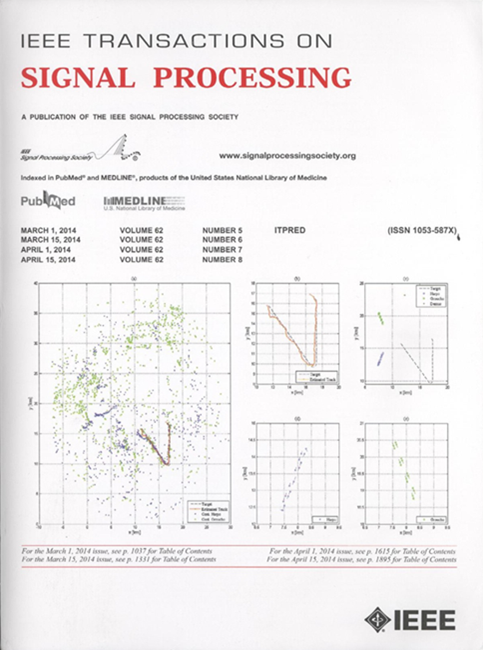具有定时抖动的离散过程的卡尔曼滤波器
IF 4.6
2区 工程技术
Q1 ENGINEERING, ELECTRICAL & ELECTRONIC
引用次数: 0
摘要
由本地时钟(生物时钟、物理时钟或数字时钟)产生的采样间隔已知具有一定数量的误差(确定性或随机),称为定时抖动。后者可以在性质和大小上有所不同,这取决于时间尺度的形成和动态过程的采样精度。在状态估计中,定时抖动会导致不能总是忽略的额外误差。本文对具有随机时序抖动的离散过程的卡尔曼滤波器进行了改进,称之为抖动卡尔曼滤波器(JKF)。JKF是直观的和一阶近似的。结果表明,为了应对时序抖动,系统噪声协方差获得了一个附加项,该附加项与分数阶抖动标准差和过程速率成正比。通过对多项式模型和谐波模型的大量数值模拟表明,过程速率的无限增大导致抖动引起的误差也无限制地增大。因此,抖动对快速进程是危险的,但在缓慢进程中可以忽略不计。实验验证了JKF的高效率。本文章由计算机程序翻译,如有差异,请以英文原文为准。
Kalman Filter for Discrete Processes With Timing Jitter
The sampling interval generated by a local clock (biological, physical, or digital) is known to have a certain amount of errors (deterministic or random) called timing jitter. The latter can vary in nature and magnitude depending on how accurately the time scale is formed and the dynamic process is sampled. In state estimation, timing jitter can cause extra errors that cannot always be ignored. In this paper, we modify the Kalman filter for discrete processes with random timing jitter and call it jitter Kalman filter (JKF). The JKF is developed both intuitively and in the first-order approximation. It is shown that to cope with timing jitter, the system noise covariance acquires an additional term, which is proportional to the fractional jitter standard deviation and the process rate. Based on extensive numerical simulations of polynomial and harmonic models, it is shown that unlimited increase in the process rate leads to the fact that the error caused by jitter also grow without limit. Thus, jitter is dangerous for fast processes, but can be neglected in slow processes. Experimental testing has confirmed the high efficiency of JKF.
求助全文
通过发布文献求助,成功后即可免费获取论文全文。
去求助
来源期刊

IEEE Transactions on Signal Processing
工程技术-工程:电子与电气
CiteScore
11.20
自引率
9.30%
发文量
310
审稿时长
3.0 months
期刊介绍:
The IEEE Transactions on Signal Processing covers novel theory, algorithms, performance analyses and applications of techniques for the processing, understanding, learning, retrieval, mining, and extraction of information from signals. The term “signal” includes, among others, audio, video, speech, image, communication, geophysical, sonar, radar, medical and musical signals. Examples of topics of interest include, but are not limited to, information processing and the theory and application of filtering, coding, transmitting, estimating, detecting, analyzing, recognizing, synthesizing, recording, and reproducing signals.
 求助内容:
求助内容: 应助结果提醒方式:
应助结果提醒方式:


